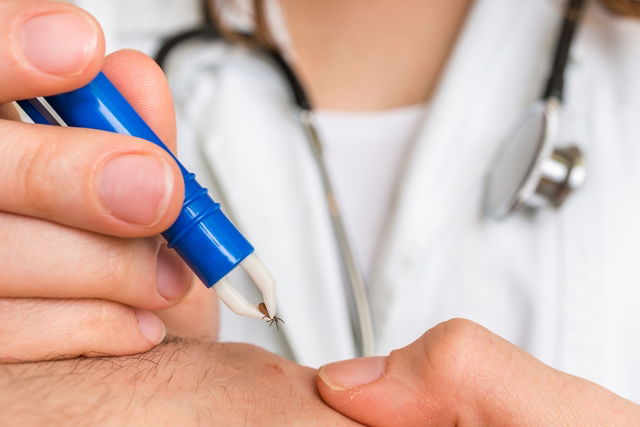Babesiosis is an infectious disease transmitted through tick bites. Ticks that cause this infection are also infected by Babesia sp protozoans. Following the tick bite, patients may present with symptoms like fever, headache, excessive fatigue and weakness.
This condition presents with more intense symptoms in older adults and/or patients with a compromised immune system. It is also common in dogs.
It is important for babesiosis to be diagnosed and treated promptly to prevent complications like enlarged liver, enlarged spleen and hemolytic anemia. If you notice signs or symptoms of babesiosis, it is fundamental to consult an infectious disease specialist for assessment. The doctor may prescribe medications like antiparasitics and/or antibiotics.

Common symptoms
The main symptoms of babesiosis are:
- Fever
- Headache
- Redness, swelling and local heat around the tick bite
- Chills
- Cold sweats
- Muscular pain
- Excessive fatigue
- Weakness
- Yellow skin and nails, due to red blood cell breakdown
- Blood in the urine and dark urine
In most cases, babesiosis does not present with any symptoms. However, symptoms can emerge within 4 weeks of the initial tick bite.
Some people can experience more intense symptoms if the tick is able to infect more red blood cells. They may additionally present with hemolytic anemia, neutropenia, thrombocytopenia, kidney failure, pulmonary edema, and liver abnormalities. These symptoms are more common in people with a compromised immune system. Patients who are generally healthy prior to the tick bite will usually feel better with a week.
Confirming a diagnosis
A babesiosis diagnosis should be confirmed by a family doctor or infectious disease specialist through the findings of a physical assessments and of lab tests. The doctor order bloodwork to evaluate red blood cells and their functioning, to see if they have been affected by the tick infection.
Most people will not have a high level of the infectious agent in their blood, however the doctor can order antigen and antibody testing to check for activity against the Babesia sp. In addition, the doctor can also order molecular testing as a way to rule out Plasmodium sp. This parasite causes malaria, and can also be found within red blood cells.
What causes babesiosis?
Babesiosis is an illness caused by the Babesia sp. protozoan, which is a type of parasite that can infect ticks, particularly Ixodes spp. ticks. The main species that cause this infection are the Babesia divergens and the Babesia microti.
When transmitted, this parasite enters the red blood cell to stimulate its destruction. This is what causes the characteristic symptoms of babesiosis. Symptoms may be more significant in patients over 60 years old and/or with chronic diseases like cancer, lymphoma, kidney disease, liver disease, or HIV.
Possible complications
Complications from babesiosis are more common in patients with a weakened immune system. Some complications include:
- Changes to blood pressure
- Increased red blood cell destruction
- Decreased platelet levels, leading to an increased risk for bleeding
- Changes to liver, kidney or lung function
It is important for people with a weakened immune system to adhere to prescribed treatment in order to prevent complications.
How it is transmitted
The main way babesiosis is transmitted is through infected tick bites. For the patient to become infected, he or she needs to be in contact with an infected tick for at least 12 hours, so that the parasite reaches the bloodstream and enters the red blood cells.
Babesiosis can also be transmitted through a blood transfusion using infected blood, or through pregnancy, from mother to baby, although these forms of transmission are rare.
Treatment options
Treatment for babesiosis should be oriented by a family doctor or infectious disease specialist. Treatment depends on the patient’s symptoms and the severity of treatment. The doctor may recommend antiparasitics and antibiotics, like quinine + clindamycin, or atovaquone + azithromycin.
Patients without symptoms will usually not be prescribed any specific treatment, as the disease is likely to resolve on its own.
